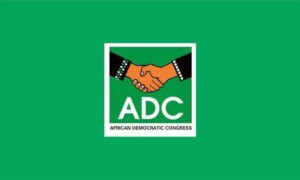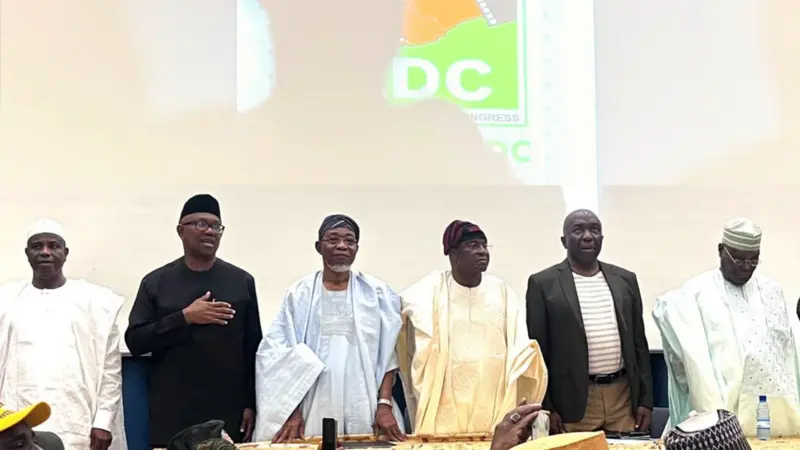The coalition of opposition parties rallying under the African Democratic Congress (ADC) has stumbled in its first significant electoral outing, securing only 8,068 votes across 12 states in Saturday’s by-elections.

The coalition, which formally coalesced in June 2025 as a united platform for the 2027 general elections, brings together some of Nigeria’s most prominent political figures. Among them are former Vice President Atiku Abubakar; ex-Senate President David Mark; former PDP chairman Uche Secondus; and former governors Babangida Aliyu (Niger), Sam Egwu (Ebonyi), Aminu Tambuwal (Sokoto), and Liyel Imoke (Cross River).

Other notable members include ex-Kaduna governor Nasir El-Rufai; 2023 Labour Party presidential candidate Peter Obi; former ministers Rauf Aregbesola (Interior), Rotimi Amaechi (Transport), Solomon Dalung (Sports); former APC chairman Odigie Oyegun; and ex-Sports Minister Bolaji Abdullahi, among others.
Ahead of Saturday’s polls, the interim National Chairman of ADC, Senator David Mark, had urged Nigerians to support the coalition’s candidates, while Obi, El-Rufai, and other coalition heavyweights campaigned vigorously in Anambra, Kaduna, Edo, and Oyo.

How the Votes Fell
Despite the strong presence of opposition leaders, the Independent National Electoral Commission (INEC) results showed the All Progressives Congress (APC) consolidating its dominance with sweeping victories across several constituencies.
The Peoples Democratic Party (PDP), the New Nigeria Peoples Party (NNPP), and the All Progressives Grand Alliance (APGA) also secured notable wins, while the ADC failed to clinch a single seat.

- Kaduna State: In Chikun/Kajuru and Zaria Kewaye federal constituencies, APC and PDP recorded over 10,000 votes each, while ADC managed just 146 votes in Basawa constituency.
- Oyo State: In Ibadan North Federal Constituency, ADC candidate Femi Akin-Alamu secured only 88 votes, compared to PDP’s 18,404 and APC’s 8,312.
- Adamawa State: ADC polled a mere 42 votes.
- Edo State: ADC garnered just 25 votes, dwarfed by APC’s 77,053.
- Taraba State: ADC candidate Badina Garba scored 2,069 votes in the Karim 1 constituency, placing third behind APC and PDP.
- Anambra State: ADC’s best showing came here, with Donald Amangbo polling 2,889 votes for the Anambra South Senate seat, and Justina Azuka earning 1,909 votes in the Onitsha North Assembly race. Combined, these accounted for more than half of ADC’s nationwide tally. Still, APGA retained its dominance in the state.
Overall, APC tightened its grip with commanding victories in Edo, Ogun, Kogi, and Jigawa, while APGA remained strong in Anambra.

Onanuga Taunts Atiku, Obi, El-Rufai
Following ADC’s poor performance, Presidential spokesman Bayo Onanuga mocked opposition leaders on social media.
In a post on X, Onanuga shared a photo of Atiku, Obi, and El-Rufai with the caption: “How is the market now?” — a clear swipe at their inability to translate political weight into votes.

ADC Explains Poor Showing
Reacting to the outcome, ADC chieftain Hon. Chille Igbawua argued that the candidates fielded in the by-elections lacked the personal political weight of figures like Obi, Atiku, or El-Rufai.
He noted that while political structures matter, personality often determines election outcomes. Citing Obi’s 2023 presidential run, he said:
“When Peter Obi contested for the presidency, he didn’t have a structure and yet he won in twelve states, including Lagos. Personality is critical. If Obi, Atiku, or El-Rufai were on the ballot on Saturday, the results would have been different.”
Igbawua insisted that ADC’s participation was still a “wonderful performance,” given that the party had been relatively dormant before the coalition revitalised it.

Party Rejects Results, Alleges Intimidation
In a separate statement, ADC’s National Publicity Secretary Bolaji Abdullahi dismissed the election results, alleging intimidation and vote-buying.
He maintained that the outcome did not reflect the coalition’s true strength, instead pointing to what he described as the “decline of Nigeria’s electoral process” under President Bola Tinubu’s APC administration.
Despite the setback, ADC leaders insist the coalition remains committed to challenging APC dominance in 2027. However, Saturday’s results underscore the steep road ahead for an alliance yet to translate its star-studded leadership into grassroots electoral power.




